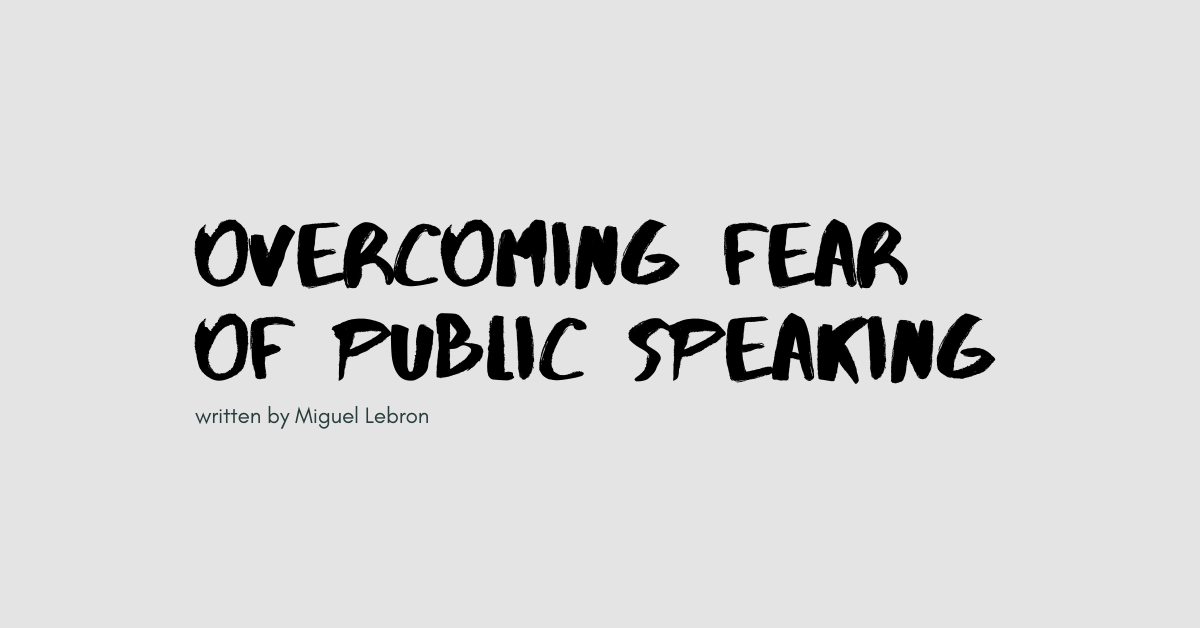Overcoming Fear of Public Speaking

What creates anxiety about giving a speech in public?
Many individuals aren't aware of what's causing their speech anxiety. Several elements may be at play, and each person's causes and experiences with fear may differ. The following are the most commonly identified reasons for public speaking anxiety:
- Self-consciousness
- Fear of being judged
- Fear of coming across as nervous
- Failures in the past
- Imaginary failure
- Insufficient planning
While you may feel nervous heading before the audience. Nevertheless, there is no limit to how thoroughly you can prepare for a public speaking event. Keep in mind that even the most seasoned public speakers get nervous. And while you may not be able to control that butterfly in your stomach, there's no reason to let it get you flustered. You can probably speak to a large number of individuals if you can speak to a small group of people, although you may not think so. Your impression of yourself may be more tainted than those of the audience. And the audience is more likely to empathize with your anxiety than pass judgment on you. You can't go back in time and make up for a horrible speech, but you may make amends by continuing to develop.
You are not alone in your fear of public speaking. Glossophobia affects 40% of the population in the United States. What exactly is glossophobia? It's an anxiety condition, and it's more than just being frightened or worried about speaking in front of a crowd. You may notice your knees start to buckle, your heart is pounding, and your breathing is becoming more complex. Sweaty, dizzy, or queasy feelings are possible. You may find yourself trembling uncontrollably or wishing to flee the room. Understanding the power of positive thought can assist you in overcoming your fear of speaking in public. Whether you have glossophobia or are simply doubtful about your speech, having the correct tools can help you reach your public speaking goals.
Fear must be redefined.
Trembling hands are simply a shot of adrenaline getting you ready for the task ahead. Reframe your fear as what it is: a mood booster that increases your determination while narrowing your focus.
Imagine you are in a line towards a rollercoaster. People talk about the rollercoaster, those excited to ride it, and those exiting it. Your heart begins pounding, and your mind starts racing as you move closer to the rollercoaster. Your palms sweat, yet your friends or family are waiting for you. You are advised to take a seat. And instructed to buckle up and keep your hands inside the vehicle at all times; then the gradual ascent begins. The nervousness you've felt up to this point is your body's way of saying, "What's about to happen is out of your control," and you're aware of that, but you're prepared. Likewise, you can be prepared to manage that nervousness and crush that speech!
When you're nervous about something, it's easy to exaggerate the chances of anything horrible happening. Particular concerns should be addressed. Make a list of your unique worries and tackle them front-on. Write out all of the probable and alternative outcomes, as well as any actual facts that support each concern or the likelihood that your fears will come true.
Meditation and Visualization
Meditation is well-known for its effectiveness in calming the mind. Meditation is similar to a mental workout. It offers you the power and concentration to filter out the limiting thoughts and quiet the noise by speaking encouraging, confident, and strong words.
Choose a peaceful place, maybe your favorite chair, or a quiet place where you can relax your body and calm your mind. Take a deep breath. Inhale and exhale before you imagine yourself on stage, anticipating the opportunity to share what you've prepared with your audience. Make an engaging start that will wow your audience. Continue to draw them in as you go. Imagine yourself completing your speech with a sense of accomplishment. It's all about thinking, seeing yourself at that moment, and allowing your feelings to take you there. Allow yourself to experience that moment and replay this in your mind as needed.
Don't just see yourself on stage; feel the moment. Visualize it from all angles. See it as a first-person experience and then as an audience member impacted by your speech. In fact, as you conclude with your meditation and visualization, do so as though you were in the audience and see the speaker exiting the stage. Feel the positive reaction of the audience, and you conclude your visualization.
Right before you start your speech, you're the most anxious. You may feel yourself getting nervous before hitting the stage but refocus your mind before you open your mouth. Your mind will try to make you think everyone is judging you; your brain is telling you at this point, what if I fail? And it is at this exact moment that you must refocus your thoughts. Remember that you've arrived to provide solutions, tools, and inspiration to your audience. Keep your wits about you. And remind yourself:
No setbacks, just setups.
No procrastination, just progress.
No distractions, just dedication.
No limitations, just breakthroughs.
No obstacles, just opportunities.
I am strong enough, smart enough, and equipped to manage every blessing that comes my way; and be a blessing to those I encounter.
The only way to retrain your mind, defeat fear and impact an audience with your speech is to challenge the limiting beliefs that fear has constructed. Your brain will begin to understand it after a few presentations (typically four to six), and you will become less scared.
Schedule a free 30-minute strategy session with me. No commitment is required, just the willingness to believe there is more to life than what you've already seen, and I have a sense that is how you feel.












